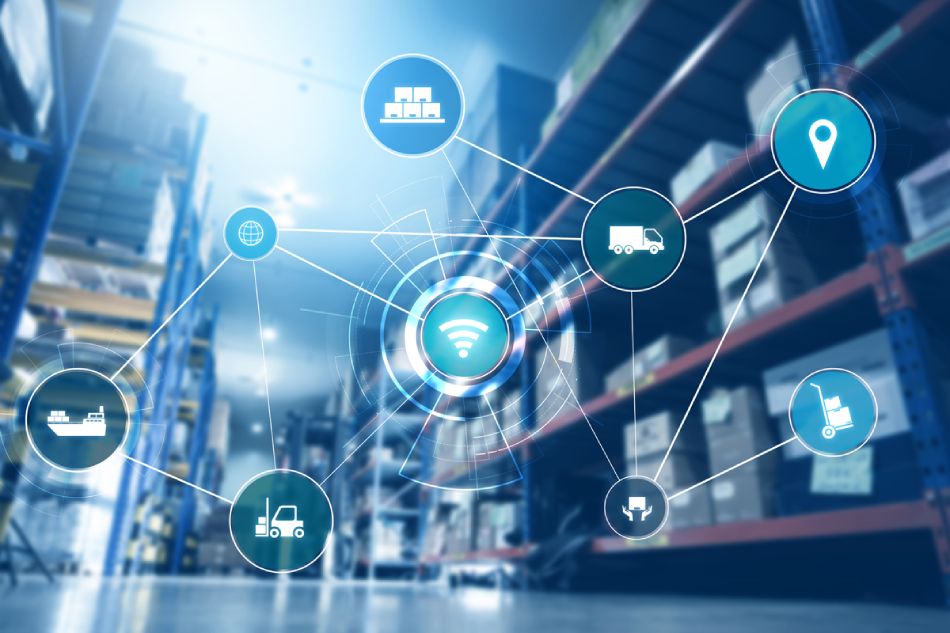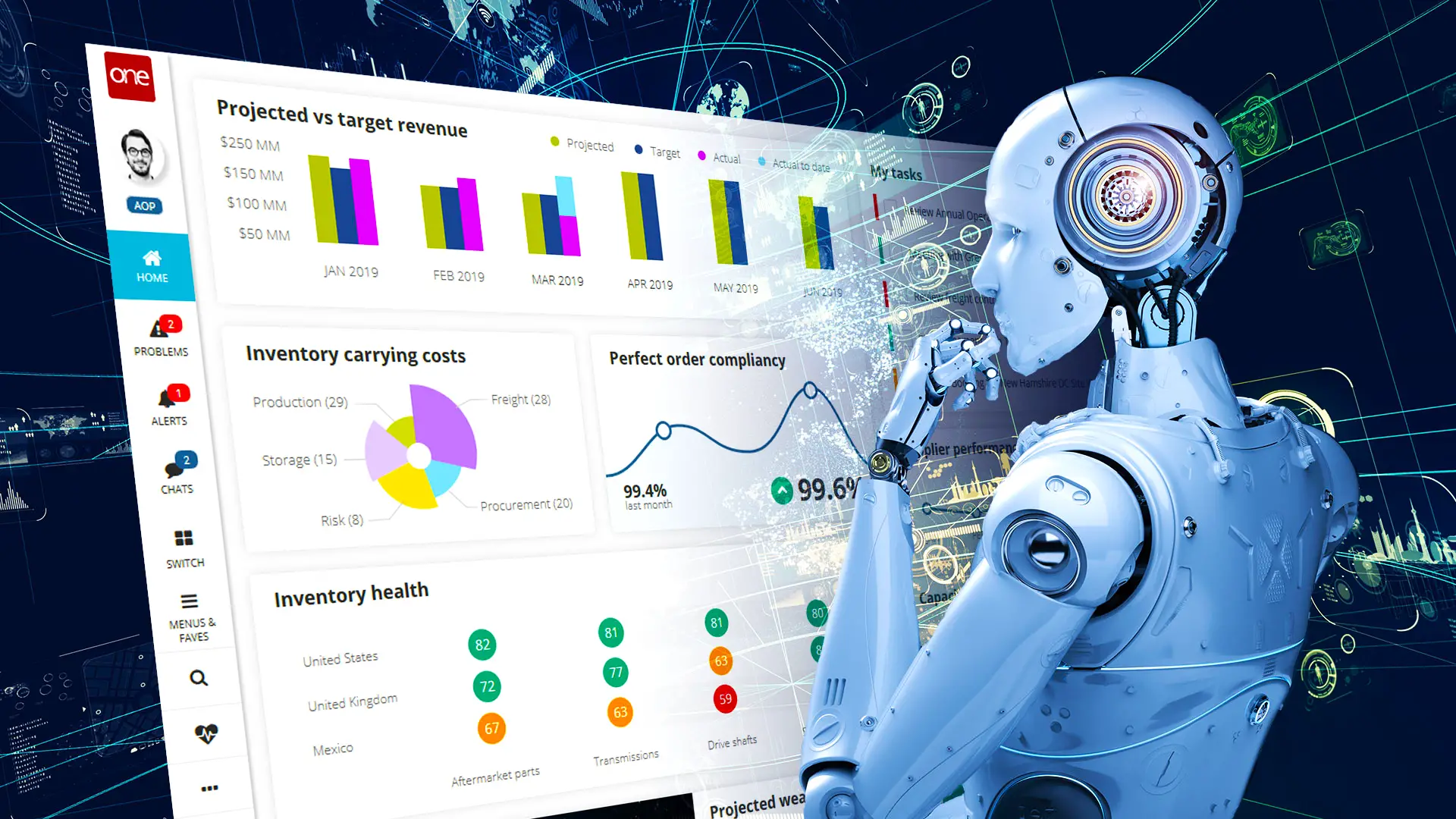AI in Supply Chain: Unlock Benefits, Challenges, and Future


Your supply chain’s agility and efficiency are essential for success in today’s fast-paced business world. Now, enter artificial intelligence (AI), a game-changer that has the potential to ultimately change how we maintain and enhance these essential networks. AI provides a wide range of practical tools and applications that can transform your supply chain and lead to notable increases in responsiveness, efficiency, and cost savings. These tools and applications range from automated logistics to predictive analytics. This extensive guide explores fundamental ideas, advantages, difficulties, and successful application of AI in supply chain management. We’ll also discuss AI’s exciting future and how it might change supply chains in the years to come.
Artificial Intelligence (AI) is the application of sophisticated algorithms and computer systems that can evaluate and comprehend data, simulating human decision-making processes.
The path that goods take from the point of production to customers’ hands is known as the supply chain. It goes through several phases: distribution, transportation, and manufacturing. Effective supply chain management guarantees the availability of goods at the appropriate time and location.
Artificial Intelligence (AI) in the supply chain refers to using intelligent technologies to streamline and optimize the entire process. Specifically, artificial intelligence (AI) aids in the automated management of inventory levels, the most economical transportation routes, and precise product demand forecasting.

AI in Supply Chain
Check out our latest AI-related articles:
AI in Software Development – Understand its Impact on the Industry
|
Increased Efficiency and Productivity |
In supply chain management, AI enhances efficiency through automated tasks, such as order processing and inventory management. By automating these activities, AI optimizes operations, particularly logistics, leading to faster deliveries and cost reduction by streamlining routes. Additionally, AI enables predictive maintenance, foreseeing equipment failures, and scheduling proactive maintenance to prevent downtime. |
|
Improved Visibility and Decision-Making |
AI integration provides real-time data insights in supply chain operations, empowering decision-makers with timely information. Predictive analytics enables AI to forecast demand fluctuations and potential risks, allowing organizations to take proactive measures. AI also fosters enhanced collaboration, facilitating department communication for improved coordination and efficiency. |
|
Reduced Costs and Increased Profitability |
The use of AI in supply chain management significantly reduces costs. It excels in inventory optimization, ensuring optimal stock levels to minimize storage costs. In transportation, AI reduces costs by optimizing routes and schedules. AI’s capabilities in improved forecasting enhance demand prediction accuracy, reducing waste and boosting profitability. |
|
Enhanced Customer Satisfaction |
AI-driven solutions directly impact customer satisfaction through faster deliveries and automated order fulfillment processes, reducing errors. AI personalizes customer experiences by providing relevant product recommendations based on individual preferences, enhancing customer loyalty. |
| Data Quality and Integration | Companies face the disadvantages of AI in supply chain with data silos, where data is fragmented across departments, hindering the collection and integration essential for AI models. The accuracy and completeness of data are critical for practical AI functionality. Data quality may lead to accurate predictions and effective decision-making. The implementation of AI necessitates careful consideration of data security and privacy. |
| Technology and Infrastructure | Implementing AI solutions entails challenges such as the high initial cost and covering expenses for software, hardware, and data infrastructure. Moreover, the process requires specialized technical expertise for both implementation and maintenance. The absence of standardized interfaces between different AI solutions complicates integration with existing systems. |
| Organizational Change and Resistance | Employees may resist AI adoption due to the fear of job displacement as AI automation becomes prevalent. A lack of understanding about AI technology and its benefits may lead to skepticism and resistance. Implementing AI necessitates significant organizational changes, and effective change management becomes challenging. |
| Ethical Considerations | AI models can introduce bias by perpetuating existing biases in data, resulting in unfair outcomes. The complexity and lack of transparency in AI models make it difficult to understand the decision-making process. Establishing clear accountability for AI decisions becomes essential to ensure fairness and transparency. |
| Legal and Regulatory Considerations | AI implementations must comply with data privacy regulations, including GDPR and CCPA. Determining liability for AI-driven decisions is complex and often needs to be clarified. Clear rules governing the use of AI technology contribute to uncertainty for businesses. |
Amazon, a pioneer in AI integration, employs AI for predictive demand forecasting. Analyzing extensive datasets enables Amazon to predict future product demand, optimizing inventory levels for timely availability. Warehouse robots equipped with AI navigate facilities, engaging in automated order fulfillment. This feature enhances efficiency and order accuracy. Moreover, AI contributes to personalized product recommendations, drawing on customer purchase history and behavior, elevating satisfaction and sales.
Maersk utilizes AI to enhance container management. AI-powered sensors in shipping containers provide real-time tracking of environmental conditions and location, which enables proactive interventions for cargo safety. AI also aids in route optimization, reducing fuel consumption and emissions and fostering cost savings and sustainability. Additionally, AI-driven systems automate various port operations, from crane movements to container stacking, improving efficiency and reducing turnaround times.
Unilever harnesses AI for demand forecasting and optimizing production and inventory levels to reduce waste and meet customer demand. Predictive maintenance through AI prevents equipment failures, reducing downtime and enhancing production efficiency. AI further aids Unilever in fraud detection within the supply chain, identifying counterfeit products, and preventing supplier fraud.

Benefits of AI in Supply Chain
Nestlé leverages AI for comprehensive supply chain optimization, encompassing sourcing, production, and distribution. This results in cost reduction and improved delivery times. AI-driven systems enable demand-driven production, aligning production with real-time demand to minimize waste and ensure product freshness. Nestlé also employs AI for personalized marketing, tailoring campaigns to individual customers, fostering increased engagement and sales.
In the automotive sector, Ford adopts AI for predictive maintenance in manufacturing plants, averting equipment failures and ensuring efficient production. AI-powered systems play a vital role in quality control, inspecting vehicles for defects, and reducing recalls. Furthermore, Ford integrates robot-assisted manufacturing, guided by AI algorithms, to enhance accuracy and efficiency in the production process.
AI is poised to revolutionize every facet of the supply chain, from forecasting to fulfillment. Imagine AI-powered robots handling repetitive tasks, predictive models preventing disruptions before they occur, and personalized deliveries tailored to individual needs. This future holds immense potential for efficiency, sustainability, and customer satisfaction.
AI’s potential is vast, but challenges remain. Developing and implementing AI responsibly, addressing ethical concerns, and ensuring data security are crucial. Businesses must collaborate and invest in training to unlock AI’s full potential.

Future of AI in Supply Chain
As AI technology evolves and becomes more accessible, even small businesses can leverage its power. The future of the supply chain lies in collaboration, data-driven decision-making, and a focus on sustainability. By embracing AI and addressing its challenges, we can create a future where supply chains are efficient but also responsible and ethical.
As we’ve explored, AI presents a powerful opportunity to transform supply chains, driving significant efficiency, productivity, and sustainability improvements. Businesses can gain a competitive edge in the ever-evolving market by optimizing processes, predicting disruptions, and gaining deeper insights.
However, navigating the complex world of AI implementation can be challenging. That’s where TECHVIFY comes in. Our team of experienced IT specialists, coupled with our cutting-edge AI expertise, is dedicated to helping businesses unlock the full potential of AI in the supply chains.
Contact TECHVIFY today and let us help you embrace the future of supply chain efficiency. Together, we can unlock new levels of optimization and success for your business.


Table of ContentsI. What is AI in Supply Chain?II. Benefits of AI in Supply ChainIII. Challenges in Implementing AI in Supply ChainIV. Successful Examples of AI in Supply Chain1. Amazon2. Maersk3. Unilever4. Nestlé5. FordV. Future of AI in Supply ChainConclusion Technological advancements are paving new paths for companies across different sectors, and the logistics industry is no exception. According to a survey by Gartner, 87% of supply chain professionals plan to invest in enhancing the resilience of their platforms. Logistics encompasses a broad and complex array of processes that demand the utmost precision and continuous optimization. Companies can automate and…
26 July, 2024

Table of ContentsI. What is AI in Supply Chain?II. Benefits of AI in Supply ChainIII. Challenges in Implementing AI in Supply ChainIV. Successful Examples of AI in Supply Chain1. Amazon2. Maersk3. Unilever4. Nestlé5. FordV. Future of AI in Supply ChainConclusion The technology sector is advancing at an unprecedented pace, and the HR landscape is evolving right alongside it. To attract top talent, HR professionals and organizations need to stay ahead of emerging technology hiring trends. This year, we are witnessing significant shifts in hiring practices that will redefine our understanding of the future workforce. According to a Microsoft study, the…
25 July, 2024

Table of ContentsI. What is AI in Supply Chain?II. Benefits of AI in Supply ChainIII. Challenges in Implementing AI in Supply ChainIV. Successful Examples of AI in Supply Chain1. Amazon2. Maersk3. Unilever4. Nestlé5. FordV. Future of AI in Supply ChainConclusion Customized software plays a major role in managing various tasks within the telecom industry. It is essential for allocating numbers to subscribers and managing networks through optimized and AI-enabled routing protocols. Additionally, it aids in detecting fraud with intelligent telecom software development solutions and maintaining detailed subscriber profiles, including comprehensive call recording reports. I. A Quick Look into the Telecommunication…
24 July, 2024


Thank you for your interest in TECHVIFY Software.
Speed-up your projects with high skilled software engineers and developers.
By clicking the Submit button, I confirm that I have read and agree to our Privacy Policy